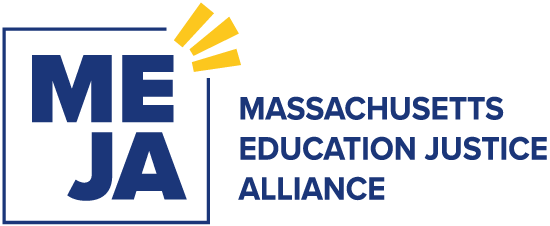Massachusetts Parents, Students & Educators Praise Public School & College Funding in House Budget; Highlight Need for Long-Term Plan to Reinvest in Public Colleges”
BOSTON – Ahead of next week’s House budget debate, parents, students, and educators with the Massachusetts Education Justice Alliance today praised the proposed House FY23 budget for fully implementing another year of the Student Opportunity Act and increasing funding for the state’s public colleges and universities.
“Students need more support than ever before to recover from the disruption of the last two years, so we’re glad to see the House put forward a budget that would fund the next year of the Student Opportunity Act, sending millions of dollars in much-needed aid to classrooms in high-poverty communities that have been hit the hardest by the pandemic. With a minimum aid increase of $60 per student and accelerated support for charter reimbursement funding to local public school districts, this budget supports every school district in the state, as students in every community are facing challenges as we rebuild,” said Vatsady Sivongxay, Executive Director of the Massachusetts Education Justice Alliance - Education Fund. “And while we still need a long-term plan to reinvest in the quality and affordability of our public colleges and universities, the House’s budget will provide critical new financial aid to students and make overdue investments in campuses across the state. Enrollment in Massachusetts’ public colleges has dropped sharply because after decades of underfunding from the state, the resulting high cost of tuition and fees is pricing families out. This year’s budget begins the critical work of making our public colleges and universities more accessible to poor, working, and middle-class students.”
“Students across Massachusetts urgently need the help the House budget would provide,” she continued. “We thank House budget-writers for choosing to invest in students and their families in this budget, rather than giving away millions of dollars in tax breaks to the ultra-rich.”
The House budget includes the following steps to implement the landmark Student Opportunity Act (SOA), passed in 2019, which promised to invest significantly in high-quality public education and fix the state’s outdated school funding system by 2027:
A $495 million increase in Chapter 70 state aid to local school districts, keeping the main provision of the SOA on track to be fully implemented by FY 2027.
A $60 increase in Minimum Per-Student Aid, ensuring that all districts get additional state aid to help them respond to increasing costs and provide much-needed supports for students.
$244 million to fully fund charter school reimbursement funding to local school districts, helping them make up for the loss of local funding to charter schools. This represents a full implementation of this provision of the SOA.
$411 million to fund the Special Education Circuit Breaker that reimburses districts for a portion of the cost of special education services, keeping this provision of the SOA on schedule for full implementation.
“We need to help the school system move away from looking at family engagement as a one-time program or collection of random events, like fundraisers and bake sales, and focus more on looking at sustainable ways of how parents and families are constantly incorporated in every aspect of the learning settings within the school,” said Chantel, a Worcester parent. “Making every school a community school has to be our collective vision.”
“Every student has the potential to break barriers, to be the change, and to achieve their dreams. But what limits them to reach their full potential is the lack of resources and support,” said Gared Wong, a senior at Framingham High School. “It’s time and it’s been time to invest in these students. We need to support every single student and give them a chance because these students are the future.”
The House budget includes the following new funding for the state’s public higher education system:
A $25 million increase for the MASSGrant scholarship program, enough to cover tuition and fees for all low-income students.
A $77 increase in funding for the UMass system, a $24 million increase for State Universities, and an $11 million increase for Community Colleges
“During COVID, faculty and staff at our public universities experienced high turnover, stress, and an increased workload as we provided students with the services and educational experiences they needed," said Eve Weinbaum, President of the Massachusetts Society of Professors, which represents librarians and faculty at UMass Amherst. "After years of underfunding, our campuses are feeling enormous strain – we don’t have enough staff and faculty to keep the libraries open, manage external grants, or offer the courses our students need to graduate on time. The House budget is a welcome down payment toward high-quality, affordable higher education for all residents of the Commonwealth, but even more is needed to keep up with inflation and student needs, so we hope that the Senate will do even better.”
A recent report from the Hildreth Institute, a local higher education policy think tank, found that due to declining state funding of public higher education, tuition and fees at the state’s public colleges and universities have increased at one of the fastest rates in the nation, drastically exceeding family incomes. Since 2000, while median family income in Massachusetts has risen only 13 percent, state funding for public higher education has, after adjusting for inflation, fallen 20 percent. As a result, community college students in Massachusetts have faced a 52 percent increase in tuition and fees, and students at the state's four-year public universities have faced a 59 percent increase.
“Since I’ve been on campus, I’ve watched myself and my peers struggle to stay afloat with rising education costs, multiple jobs, and heavy course loads, all while student services at my university suffer due to lack of funding,” said Cass O’Connor, a student at Salem State University whose hometown is East Longmeadow. “My school is not unique: students and colleges across the Commonwealth are hurting. Public education is becoming less public and more expensive each year, and the problem won’t fix itself. My peers and I need greater state funding for public higher education.”

